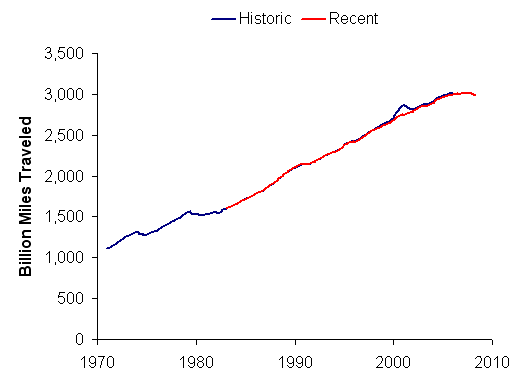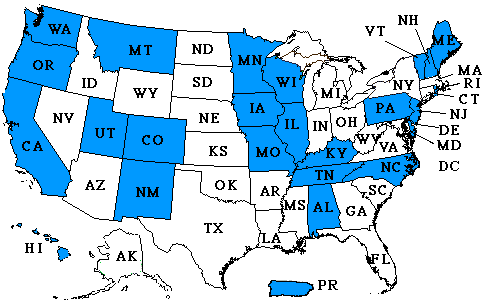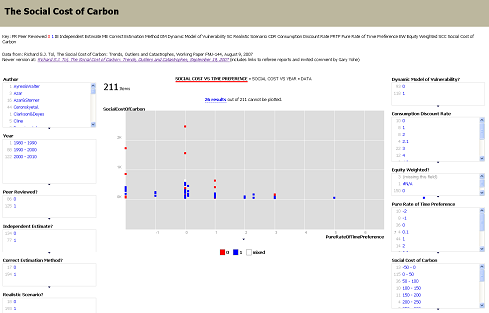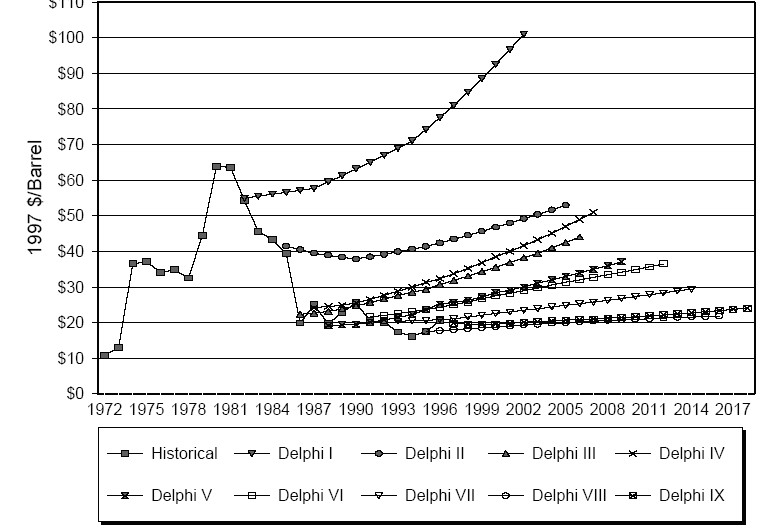GreenCarCongress has some interesting tidbits of recent data: vehicle miles traveled is down and sales of cars surpass trucks, reversing long run trends. An interesting side effect of diminished driving and fuel use is that less money goes into the federal Highway Trust Fund. Because a small portion funds transit, this pulls the rug out from under alternative modes just when they’re needed. I immediately wondered whether the recent falloff in VMT is similar to what happened around the 1973 and 1979 oil price spikes. DOT’s Traffic Volume Trends data provides the answer, if you add historic archive data to recent reports:
US Regional Climate Initiatives – Model Roll Call
The Pew Climate Center has a roster of international, US federal, and US state & regional climate initiatives. Wikipedia has a list of climate initiatives. The EPA maintains a database of state and regional initiatives, which they’ve summarized on cool maps. The Center for Climate Strategies also has a map of links. All of these give some idea as to what regions are doing, but not always why. I’m more interested in the why, so this post takes a look at the models used in the analyses that back up various proposals.
In a perfect world, the why would start with analysis targeted at identifying options and tradeoffs for society. That analysis would inevitably involve models, due to the complexity of the problem. Then it would fall to politics to determine the what, by choosing among conflicting stakeholder values and benefits, subject to constraints identified by analysis. In practice, the process seems to run backwards: some idea about what to do bubbles up in the political sphere, which then mandates that various agencies implement something, subject to constraints from enabling legislation and other legacies that do not necessarily facilitate the best outcome. As a result, analysis and modeling jumps right to a detailed design phase, without pausing to consider the big picture from the top down. This tendency is somewhat reinforced by the fact that most models available to support analysis are fairly detailed and tactical; that makes them too narrow or too cumbersome to redirect at the broadest questions facing society. There isn’t necessarily anything wrong with the models; they just aren’t suited to the task at hand.
My fear is that the analysis of GHG initiatives will ultimately prove overconstrained and underpowered, and that as a result implementation will ultimately crumble when called upon to make real changes (like California’s ambitious executive order targeting 2050 emissions 80% below 1990 levels). California’s electric power market restructuring debacle jumps to mind. I think underpowered analysis is partly a function of history. Other programs, like emissions markets for SOx, energy efficiency programs, and local regulation of criteria air pollutants have all worked OK in the past. However, these activities have all been marginal, in the sense that they affect only a small fraction of energy costs and a tinier fraction of GDP. Thus they had limited potential to create noticeable unwanted side effects that might lead to damaging economic ripple effects or the undoing of the policy. Given that, it was feasible to proceed by cautious experimentation. Greenhouse gas regulation, if it is to meet ambitious goals, will not be marginal; it will be pervasive and obvious. Analysis budgets of a few million dollars (much less in most regions) seem out of proportion with the multibillion $/year scale of the problem.
One result of the omission of a true top-down design process is that there has been no serious comparison of proposed emissions trading schemes with carbon taxes, though there are many strong substantive arguments in favor of the latter. In California, for example, the CPUC Interim Opinion on Greenhouse Gas Regulatory Strategies states, “We did not seriously consider the carbon tax option in the course of this proceeding, due to the fact that, if such a policy were implemented, it would most likely be imposed on the economy as a whole by ARB.” It’s hard for CARB to consider a tax, because legislation does not authorize it. It’s hard for legislators to enable a tax, because a supermajority is required and it’s generally considered poor form to say the word “tax” out loud. Thus, for better or for worse, a major option is foreclosed at the outset.
With that little rant aside, here’s a survey of some of the modeling activity I’m familiar with:
Continue reading “US Regional Climate Initiatives – Model Roll Call”
Exhibit A – the Social Cost of Carbon
I recently discovered a cool set of tools from MIT’s Simile project. My favorites are Timeline and Exhibit, which provide a fairly easy way to create web sites where visitors can interact with data. As a test, I built an Exhibit containing Richard Tol’s survey of assessments of the social cost of carbon (SCC):
Climate Beliefs Follow Party Lines
From the latest National Journal‘s Congressional Insiders Poll. Perhaps this is another special case of the general phenomenon of elites being more politically polarized.
More Oil Price Forecasts
The history of long term energy forecasting is a rather mixed bag. Supply and demand forecasts have generally been half decent, in terms of percent error, but that’s primarily because GDP growth is steady, energy intensity is price-inelastic, and there’s a lot of momentum in energy consuming and producing capital. Energy price forecasts, on the other hand, have generally been terrible. Consider the Delphi panel forecasts conducted by the CEC:
In 1988, John Sterman showed that energy forecasts, even those using sophisticated models, were well represented by a simple adaptive rule: Continue reading “More Oil Price Forecasts”
Effects of Global Change on the US
The Climate Change Science Program web site has the newly-released Scientific Assessment of the Effects of Global Change on the United States frontpage, along with a Revised Research Plan for the CCSP.
SRES – We've got a bigger problem now
Recently Pielke, Wigley and Green discussed the implications of autonomous energy efficiency improvements (AEEI) in IPCC scenarios, provoking many replies. Some found the hubbub around the issue surprising, because the assumptions concerned were well known, at least to modelers. I was among the surprised, but sometimes the obvious needs to be restated loud and clear. I believe that there are several bigger elephants in the room that deserve such treatment. AEEI is important, as are other hotly debated SRES choices like PPP vs. MEX, but at the end of the day, these are just parameter choices. In complex systems parameter uncertainty generally plays second fiddle to structural uncertainty. Integrated assessment models (IAMs) as a group frequently employ similar methods, e.g., dynamic general equilibrium, and leave crucial structural assumptions untested. I find it strange that the hottest debates surround biogeophysical models, which are actually much better grounded in physical principles, when socio-economic modeling is so uncertain.
Better Get a Bucket
Nature News and Climate Feedback report that cooling of sea surface temperatures ca. 1945 is an artifact of changes in measurement technology. ClimateAudit claims priority. Lucia comments.
Will this – like the satellite temperature trend – be another case of model-data discrepancies resolved in favor of the models?
Update: Prometheus wonders if this changes IPCC conclusions.
Business & Climate – What to Wish For?
One observation from my recent experience with climate policy in California is that businesses – even energy intensive ones – are uncertain how to engage in the public debate. Climate policy is a messy space with many competing options, and it’s hard to know what to wish for. With that in mind, here’s a quick survey of what various business groups are saying.
No Gas
Every year or two the “gas out” email arrives in my inbox. This year, it’s May 15th when “all internet users are to not go to a gas station in protest of high gas prices.” Wait – am I supposed to avoid gas stations, or protesting at gas stations? I’m amazed at the durability of this internet chain letter, which now claims a ten-year history: “In April 1997, there was a “gas out” conducted nationwide in protest of gas prices. Gasoline prices dropped 30 cents a gallon overnight.” A Monty Python tune from The Meaning of Life jumps to mind:
So remember when you’re feeling very small and insecure
How amazingly unlikely is your birth
And pray that there’s intelligent life somewhere up in space
Because there’s bugger all down here on earth.




